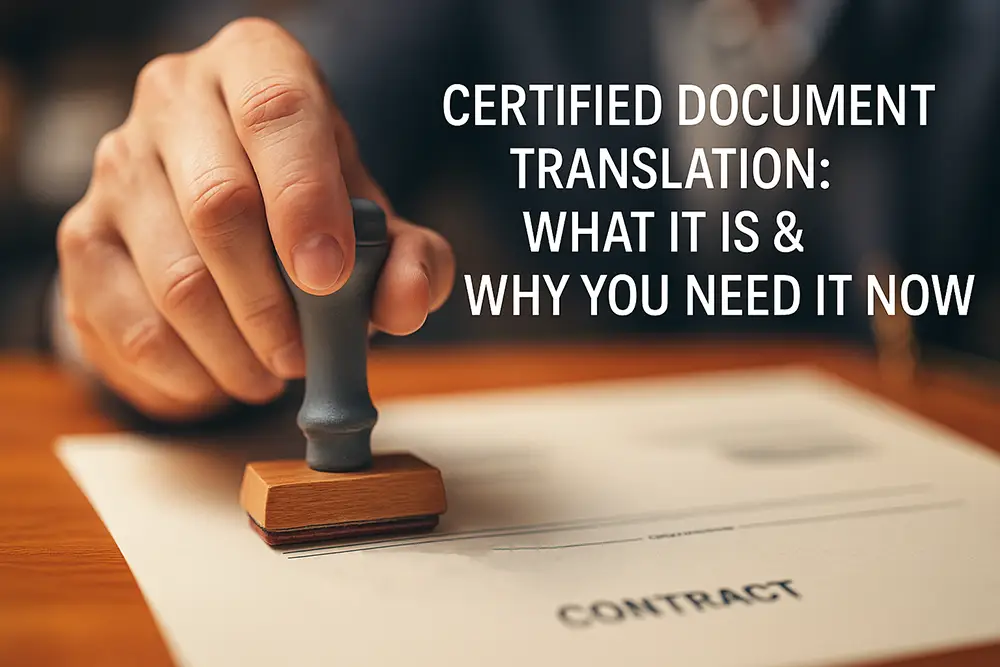
In today’s globalized business world, a simple mistake in translation can cost you a contract—or worse, legal trouble. Imagine submitting your trade license for approval, only to be told it’s rejected because the translation isn’t “certified.” Time lost. Opportunity missed. Reputation questioned.
Business owners in the UAE constantly handle important paperwork—contracts, employee visas, financial documents—many of which cross language borders. But not all translations are equal. Some are just words; others carry legal weight. Certified document translation belongs to the latter category, which can be the difference between progress and penalty.
If you’ve ever wondered whether your business needs certified translation—or if your current provider is truly compliant—read on. We’re unpacking everything you need to know to stay legally secure, professionally prepared, and internationally ready.
The official translation of a document includes a signed declaration by a certified translator or a translation agency confirming that the translation is both accurate and complete.
This isn’t just a high-quality translation—it’s legally recognized. It’s often required when submitting documents to government bodies, courts, immigration authorities, and other institutions.

Uncertified documents can be outright rejected in these scenarios, delaying vital business or legal processes.
In the UAE’s tightly regulated environment, certified document translation isn’t optional—it’s mandatory for many activities. Here are common business contexts where certification is crucial:
A certified translation is your insurance policy if your paperwork moves across borders.
Below are the key reasons why businesses and individuals rely on certified translation services for important documentation:
One of the most critical benefits is formal recognition by UAE government agencies and international authorities. Certified translations are required for submissions to bodies such as:
Without certification, translations may be deemed invalid, no matter how high their quality. Certified translations come with a signed declaration from the translator or agency affirming the translation’s accuracy and completeness, providing it with legal validity and official recognition.
Unlike general translation, certified translation is not just about converting words—it’s about ensuring that legally binding meanings are preserved. Contracts, power of attorney, immigration records, and other legal documents contain sensitive clauses, terminologies, and implications that must be conveyed precisely.
Mistakes in legal translation can result in:
Certified translators are trained to handle legal terminology, jurisdiction-specific language, and formatting standards that meet regulatory expectations. This accuracy protects against misinterpretation or administrative delays.
Certified translations can significantly accelerate the processing time of applications, registrations, and legal procedures. Government agencies and official bodies are more likely to approve properly certified documents on the first submission, avoiding frustrating back-and-forths.
This is particularly important when dealing with:
In fast-moving commercial environments like the UAE, time is money—and certified translation helps ensure critical processes stay on track.
Regulatory compliance is a non-negotiable factor in doing business in the UAE. Whether onboarding an employee from overseas, establishing a foreign partnership, or submitting legal filings in Arabic, certified translation ensures you comply with all relevant documentation standards.
Certified translations demonstrate:
This reduces the chance of administrative penalties, legal complications, or reputational risk with government entities.
A signed statement of accuracy accompanies certified translations and may include the following:
This creates a clear audit trail and accountability chain, ensuring the document can be verified anytime. It also provides transparency in legal and professional settings, giving you and the receiving party confidence in the document’s authenticity.
Certified document translations are accepted in the UAE and are often recognized by international authorities and foreign embassies. This is essential for:
A certified translation prepared to accepted standards ensures your documents retain their validity across borders, facilitating smooth cross-jurisdictional dealings.
Clarity is paramount, from medical records and insurance claims to court affidavits and financial disclosures. Certified translations provide a faithful and unambiguous version of the original document, avoiding errors that could compromise:
Certified translations help protect personal rights, business interests, and professional reputations in sensitive or high-stakes scenarios by ensuring accurate representation of intent.
Here’s a quick reference list of documents that often demand certified translation in the UAE:
If your document is destined for a government desk or court clerk’s review, play it safe and certify it.
Vision Translation stands out in the UAE’s translation market for its credibility, scope, and compliance readiness. Learn more about us and our credentials to understand what sets our team apart.
Here’s why UAE professionals trust our expertise:
To explore our core service offering, visit the certified document translation service page for more details.
In the UAE’s competitive and compliance-driven business landscape, cutting corners on document translation isn’t just risky—it can be costly. Certified document translation ensures your paperwork isn’t just understood but officially accepted.
From immigration paperwork to shareholder agreements, a certified translation from Vision Translation means less stress, fewer rejections, and smoother approvals.
Ready to get started? Let us handle your certified document translation with speed, accuracy, and legal confidence. Contact us today and move forward with clarity.
